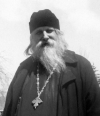12 Dec 09: Homily on the 27th Sunday after Pentecost
27th Sunday after Pentecost – the Holy Forefathers.
Homily From “The One Thing Needful,” Sermons of Archbishop Andrei (Rymarenko)
 Last week’s Gospel about the rich man who had a good harvest was like the finale to the cycle of the Gospel readings of Pentecost. It portrayed a man who had devoted all his concern to one thing: to the care of his temporary, earthly welfare. In order to keep his good harvest he destroyed the old barns, built new, larger ones, and said: “Soul, thou hast much goods laid up for many years; take thine ease, eat, drink, and be merry. But God said unto him, Thou fool, this night thy soul shall be required of thee” (Lk. 12:19-20).
Last week’s Gospel about the rich man who had a good harvest was like the finale to the cycle of the Gospel readings of Pentecost. It portrayed a man who had devoted all his concern to one thing: to the care of his temporary, earthly welfare. In order to keep his good harvest he destroyed the old barns, built new, larger ones, and said: “Soul, thou hast much goods laid up for many years; take thine ease, eat, drink, and be merry. But God said unto him, Thou fool, this night thy soul shall be required of thee” (Lk. 12:19-20).
What’s the matter? Why such a sentence? The answer to this question is given in the Gospel reading for this Sunday. It tells how the Lord prepared a feast and invited many people, in other words, everyone. And this rich man was one of those invited to the feast of God. However, he was so preoccupied with his living arrangements that he forgot about this “calling,” about the feast to which he was invited. Never did he expect that his “calling” would be fulfilled that night. This is why God said he was a fool.
Today’s parable ends with the words: “For many are called, but few are chosen” (Mt. 22:14). Who are the called ones? Everyone — God calls everyone, everyone without exception. And who are the chosen ones? The chosen ones are those who open their heart to receive the Grace of God. This is the only effort you have to make (and anyone can do it), and you will become a chosen one. To become a chosen one depends on us. We have to choose the Grace of God; and it will accomplish everything.
And so everyone was invited. But then, one after the other, they began refusing: one got married, another bought land, a third one bought oxen. Family, land owning, our social activity — all this is necessary, all this is blessed by God. But only if all of this is on the “Way” which leads to the Feast of the Lord. All reasons which were used by those invited in refusing to come were lawful, and in themselves had nothing sinful in them. But the fact that people converted these ways of life, temporary ways which should be used by us to get to the Feast of the Lord of Eternal Life, converted them into the purpose of life and forgot about the Lord’s Feast — in this is foolishness and sin.
The parable for today is the Lord’s answer to the words of one of the Pharisees who was sitting with Him: “Blessed is he that shall eat bread in the Kingdom of God! ” (Lk. 14:15). This Pharisee had in mind the Jewish nation as the chosen of God and not our willful effort to love God and our neighbor.
Here Christ answered: No, it is not sufficient to belong to the Jewish nation or to any other nation. Rather, it is necessary to fulfill God’s commandments of love for God and neighbor, and to pray that God help us to live in such a way. Then God will send us His Grace which will bring us to the Lord’s Feast.
From this Sunday of the Holy Forefathers begins a new cycle of preparation for the Birth of Christ. This is the beginning of a new life. From the manger, the light of Christ will shine on us. And in this light will be the warmth of our adoption by God. At the manger we will feel like one family.
It is the same in nature. During the whole winter there was light, but no warmth. But from the moment of Christmas, our earth will turn toward the sun and will begin to experience the life-giving warmth which in the spring will produce greenery, flowers, and fruit. So it is in our spiritual nature. Something wonderful happens every year at the manger of Christ. We all begin to feel like brothers and sisters, children of one Father. And these are not just words, but reality. Love becomes manifest. There is a desire to gladden one another, to help, and to love.
And again this year, from the manger of Christ our new ways will begin: family, monastic, social, domestic, business. But all of them will guide us to one goal — to the Kingdom of God, to communion with God, to the Lord’s Feast.
So let us not forget our dignity, our calling, that we are invited to the Lord’s Feast. And let us spend our temporary life as pilgrims, proceeding on the paths that will bring us to the Heavenly Jerusalem, where there will be “the ceaseless sound of those keeping festival.”
And then we will become not only those who are called, but those who are chosen.

 Sts Cyril and Methodius Orthodox Institute
Sts Cyril and Methodius Orthodox Institute